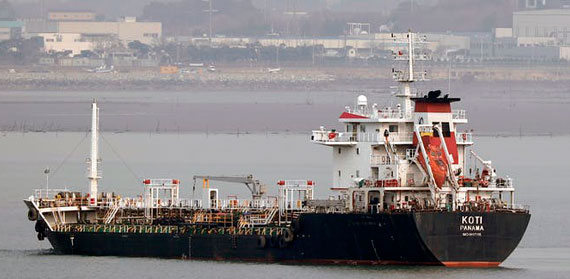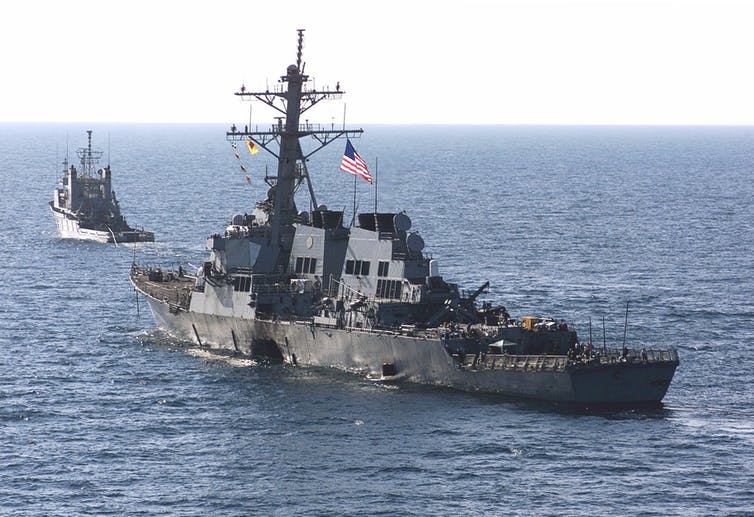A Panamanian-flagged oil carrier seized off the South Korean coast. EPA/Jeon Heon-Kyun
Guest post by Professor Ioannis Chapsos, Centre for Trust, Peace and Social Relations
South Korea recently seized two oil tankers that it says were illegally transferring oil to North Korean ships at sea. One was registered in Hong Kong, while the other flew the Panamanian flag. The ensuing fallout has focused mainly on who ordered the transaction and chartered the ship – but by the standards of North Korea’s dubious shipping transactions, this is far from the most complicated.
North Korea is adept at exploiting a serious problem with maritime security: it’s often hard to even identify ships in the first place. Ashore, government agencies issue a registration number and plates for every vehicle, but when it comes to shipping, things are very different.
Although it’s widely thought that every ship normally flies the flag of the state where she is registered with a respective number and name, North Korea’s shipping company has many times reflagged and renamed shipsto evade the UN-imposed arms embargo. By changing their identity, the ships escape the “blacklist” database, giving North Korea a better chance of procuring and/or transferring embargoed items related to the country’s missile and nuclear programme. Given the North’s ongoing nuclear activities, the international security implications are obvious.
In the shipping industry, ship owners can register their ships with countries other than the country of ownership with what are commonly known as Open Registries or Flags of Convenience (FOC). Various agencies exist to help companies or individuals with registering, reflagging or renaming their ships. FOCs come with various benefits for ship owners: cheap registration fees, low or no taxes, and freedom to employ cheap labour.
But there are downsides. Some FOCs have poor safety and training standards and no limitations in terms of the crew’s nationalities. And there are other problems, too – including more dangerous ones.
Through the cracks
A UK government report on the scrutiny of arms exports and arms controls includes a list of approved “floating armouries”, ships used by private maritime security companies to store their weapons between transits through the Indian Ocean high-risk area, where they provide security against piracy attacks on merchant vessels.
The list of ships includes MV HADI XII, flagged in Bahrain, and MV Arina Dilber, flagged in Panama. In reality, these vessels both have the same IMO identification number (8107713); the two entries refer to the same ship, renamed and reflagged.
Identification numbers such as 8107713 are part of a scheme introduced and implemented by the International Maritime Organisation (IMO) in 1987. Under its measures, ships are assigned permanent identification numbers that don’t change when the ship is reflagged. Since 2002, these numbers have had to be permanently marked in a visible place on the ship’s hull or superstructure. Passenger ships must carry the marking on a horizontal surface visible from the air.
But even as this database clearly helps to identify reflagged and renamed vessels, as in the case of the floating armoury, there are exceptions which widen the security gap.
The IMO identification number scheme is mandatory since 1994 for passenger ships and cargo ships of at least 100 and 300 gross tonnage respectively. But this leaves out plenty of others. For example, the two vessels responsible for the terrorist attacks against the USS Cole in 2000 and the French oil tanker Limburg in 2002 were not subject to the scheme.
The USS Cole after the deadly 2000 bombing that killed 17 US sailors. Wikimedia Commons/USMC
Vessels engaged solely in fishing are also exempt. The Environmental Justice Foundation, a UK-based organisation focused on investigating illegal, unreported and unregulated fishing, highlights the security challenge stemming from the exemption of fishing vessels from the IMO identification number scheme. It urges the international community to fill this security gap with a new global database for fishing vessels.
The foundation has reported on how difficult it is for coastal states, port states and Regional Fisheries Management Organisations to ascertain whether vessels landing fish or applying for fishing licenses have engaged in illicit fishing, due to the lack of this unique identification number. In West Africa in particular, it has documented how fishing boats use multiple identities, change their flags, names and radio call-signs to avoid detection and sanctions.
Back in 2013, the IMO decided to extend the voluntary application of the ship identification number scheme to fishing vessels of 100 gross tons and above. But while it’s all very well for the IMO to be concerned about the practice of ship reflagging and renaming, concern isn’t enough. Without an updated maritime security governance structure that works all over the world, states like North Korea will still be able to exploit this very useful and very dangerous security gap.
Originally written for ‘the Conversation’.





Comments are disabled